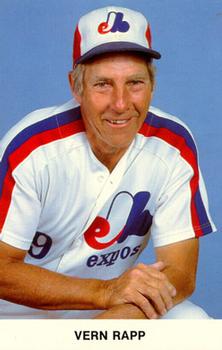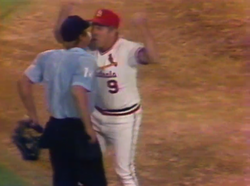 Photo Credit- Trading Card DB
Photo Credit- Trading Card DB Vern Rapp's playing career spanned 30 years. It started in 1946 for the Marion Cardinals at age 18 and included a return to the game as a player in a game in 1976 for the Denver Bears at age 48. Though there were some moments that made it seem Rapp would get a shot in the big leagues, particularly in the 1950s, it was never to be for the catcher and first baseman. He had a season in 1949 (.257, 6, 29) which could have gotten him a chance to play in the majors being those numbers were good for a catcher. However, he was behind the young Joe Garigiola and veteran Del Rice on the depth chart. He lost full seasons in 1951 and 1952 due to military service in Korea. Once Rapp returned, he once again put up decent minor league numbers (.252, 1, 30) but at this point was 6th on the team's depth chart behind Rice and 4 others.
Rapp started his managerial career in the minor leagues at age 27 for the Charleston Senators in 1955 after being released by the Cardinals organization. Overall, Rapp would manage 15 seasons in the minor leagues. In the 1960s, he was instrumental in the development of future New York Yankees Roy White and Mel Stottlemyre while he was a manager in their organization. His best success came in the 1970s when he led the Indianapolis Indians (AAA affiliate of the Cardinals) to two American Association Championships and then won another with the Denver Bears (Expos American Association AAA affiliate). This led to Rapp being hired by the St Louis Cardinals as manager for the 1977 season.
Initially, it seemed like a very good fit with Rapp in St Louis. With a solid offensive team led by Lou Brock, Garry Templeton, Keith Hernandez and Ted Simmons, the Cardinals were poised to win more games than the 72 they had won in 1976. The Cardinals of 1977 won 83 games, but Rapp's tough demeanor drew a wedge between him and his players. In addition, LHP Al Hrabosky hated the fact that he was forced to shave his mustache to comply with the new no facial hair policy. He claimed the shaving affected his performance (6-5, 10 saves, 4.38) which was the worst season of his career to that point. Hrabosky was traded after the season.
The Cardinals had no patience with the Rapp in 1978. The Cardinals opened the season 6-11, then fired Rapp and replaced him first with Jack Krol (1-1), then with former 3B Ken Boyer (62-81). Rapp joined the Montreal Expos coaching staff for the 1979 season and remained there as 1B coach until 1983. The Expos would have a winning record all five seasons under Dick Williams, Jim Fanning and Bill Virdon. This included a run in the 1981 postseason where the Expos defeated the Philadelphia Phillies in the first ever NLDS and lost to the eventual World Series Champion Los Angeles Dodgers 3-2 in the best of five NLCS.
As the 1983 season was coming to a close, it was announced that Boston Red Sox great and eventual Hall of Famer Carl Yastrzemski was set to retire. Rapp too had announced that 1983 was going to be his last season as a coach. A Boston radio station thought it would be fun to sarcastically make a big deal out of Rapp retiring. They had money pledged via a telethon and the radio station did an interview with Sheldon Bender, VP of player personnel of the Reds. After the interview, Bender spoke of Rapp during the Reds after-season meeting. Among those in attendance was Bob Howsam, a consultant at the time. In the 1970s, Howsam was the GM of the Reds "Big Red Machine" teams which won two World Series and two more NL Pennants. Howsam had a great relationship with Rapp going back to his days with the Denver Bears.
So, three days after "retiring" as coach for the Montreal Expos, it was announced that Rapp would become the next manager of the Cincinnati Reds, replacing Russ Nixon. Had it not been for the Boston radio station's satire, Rapp would have probably just ridden off into the sunset. The Reds were going through a rebuild, but never seemed to improve under Vern. The Reds sat at 51-70 through 121 games under Rapp when the decision was made to replace him with Reds icon Pete Rose. Rose had just been traded back to Cincinnati from the Montreal Expos and was to take over as player manager. Rapp would officially retire after his dismissal from the Reds.
Vern Rapp had several stops throughout his professional career, starting as a catcher with the Cardinals, to the New York Giants, Yankees and Detroit Tigers. He then made his impact in the Reds and Expos organizations before getting his first MLB job in SL. The baseball lifer also liked to insert himself into games while he was the manager. He did so in 1961, 1966 and 1976. Many different teams lost a man who had an impact on the game for 38 years. All the best to his family at this difficult time. Rest in peace.


 RSS Feed
RSS Feed
